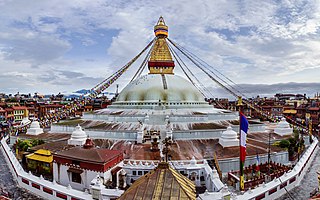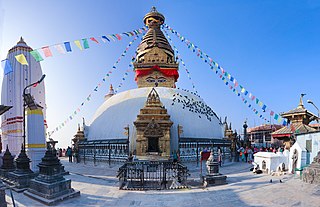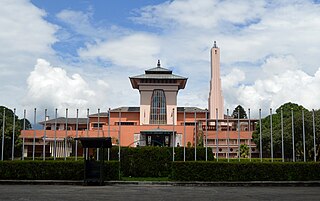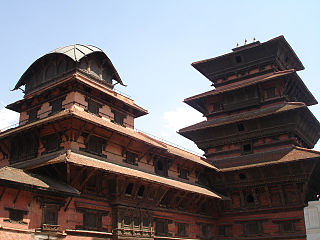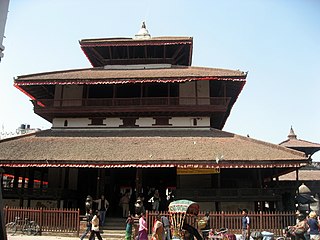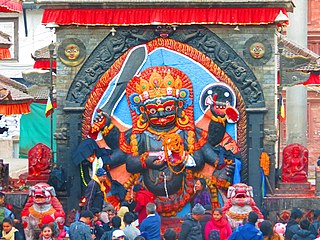9 Sights in Kathmandu, Nepal (with Map and Images)
Legend
Premium Sights
Book tickets, guided tours and activities in Kathmandu.
Guided Free Walking Tours
Book free guided walking tours in Kathmandu.
Welcome to your journey through the most beautiful sights in Kathmandu, Nepal! Whether you want to discover the city's historical treasures or experience its modern highlights, you'll find everything your heart desires here. Be inspired by our selection and plan your unforgettable adventure in Kathmandu. Dive into the diversity of this fascinating city and discover everything it has to offer.
Activities in Kathmandu1. Baudhanath
Boudha Stupa ; or Jarung Kashor (Standard Tibetan: བྱ་རུང་ཀ་ཤོར།, Wylie: bya rung ka shor), also known as Khasti Chaitya or Khāsa Chaitya, is a stupa and major spiritual landmark seen as the embodiment of the enlightened mind of all the Buddhas, located in Boudhanath, within the city of Kathmandu, Nepal. Built in the northeast of Kathmandu Valley in a Tamang village surrounded by rice paddies, the stupa gave birth to the origins of Tibetan Buddhism. It is filled with consecrated substances, and its massive mandala makes it the largest spherical stupa in Nepal and one of the largest in the world. In 1979 the Boudha Stupa became one of UNESCO's World Heritage Sites in Nepal.
2. Swayambhunath
Swayambhu Mahachaitya is an ancient religious complex atop a hill in the Kathmandu Valley, west of Kathmandu city. The Tibetan name for the site means 'Sublime Trees', for the many varieties of trees found on the hill. However, Shingun may be of in Nepal Bhasa name for the complex, Swayambhu, meaning 'self-sprung'. For the Buddhist Newars, in whose mythological history and origin myth as well as day-to-day religious practice Swayambhu occupies a central position, it is the most sacred among Buddhist pilgrimage sites. For Tibetans and followers of Tibetan Buddhism, it is second only to Boudha. Swayambhu is the Hindu name.
3. Narayanhiti Palace Museum
The Narayanhiti Palace Museum is a public museum in Kathmandu, Nepal located east of the Kaiser Mahal and next to Thamel. The museum was created in 2008 from the complex of the former Narayanhiti Palace following the 2006 revolution. Before the revolution, the palace was the residence and principal workplace of the monarch of the Kingdom of Nepal, and hosted occasions of state.
4. Basantapur Durbar Square
Kathmandu Durbar Square is a historically and culturally significant site in Kathmandu, Nepal. It is one of the three Durbar Squares in the Kathmandu Valley in Nepal that are UNESCO World Heritage Sites.
5. Kasthamandap
Kasthamandap is a reconstructed three-storied public shelter which was built by Lila Vajra. There is also a shrine consecrated to Gorakshanath situated at Maru, Kathmandu, Nepal. Several myths and stories about the date of the construction of the Kasthamandap have been resolved with the recent archeological findings: newly discovered objects during the excavation in the aftermath of the 2015 earthquake have suggested that the older Kasthamandap may have been built in the 7th century during the Lichhavi era.
6. Maitighar Mandala
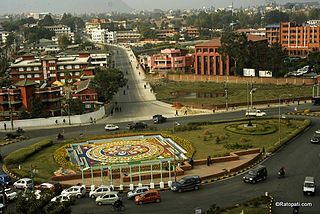
The Maitighar Mandala is a symbolic monument located in the heart of Kathmandu, Nepal. It is an island at the intersection of roads from Thapathali, New Baneshwor, Bhadrakali and at the southeast corner of Singhadurbar, the administrative centre of Nepal. It forms an important landmark in the beautification of Kathmandu city and a master piece of art depicting Buddhist relics. It also marks the initiation mark stone of one of the major highways of Nepal, Araniko Highway, that links Nepal with China.
7. शहीदगेट
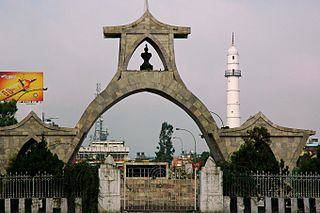
Sahid Gate or Shahid Gate is a monument in Kathmandu, Nepal. The monument was inaugurated on 13 April 1961. As of 2016, there are five statues in the gate. Four men, namely Dharma Bhakta Mathema, Gangalal Shrestha, Dashrath Chand, and Shukraraj Shastri, who are considered martyrs since they stood against the 104-year-old Rana Regime, have their statues above their arms established here. On top of all is a statue of former King Tribhuvan, who, in B.S. 2007 cooperated with people to introduce democracy in the country. The gate was designed by Shankar Nath Rimal. King Mahendra inaugurated the monument and named it Nepal Smarak. However, people started calling it Shahid gate, a name by which it is presently called.
8. Kal Bhairab Temple
Kaal Bhairav is a Hindu shrine located in Kathmandu Durbar Square, a UNESCO World Heritage Site. According to legend, the shrine was found at a paddy field and later it was placed at the Durbar Square by King Pratap Malla. Kaal Bhairav is believed to have been sculptured from a single stone.
9. Taleju Temple
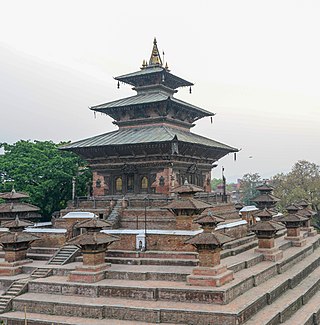
Taleju Temple is a Hindu temple dedicated to Taleju Bhawani, the royal goddess of the Malla dynasty of Nepal. It was built in 1564 by Mahendra Malla and is located in Hanuman Dhoka, Kathmandu Durbar Square, a UNESCO World Heritage Site. Inside the temple, there is a shire dedicated to Taleju Bhawani, and Kumari Devi. Taleju Temple is only opened once a year on the occasion of Dashain.
Share
How likely are you to recommend us?
Disclaimer Please be aware of your surroundings and do not enter private property. We are not liable for any damages that occur during the tours.
